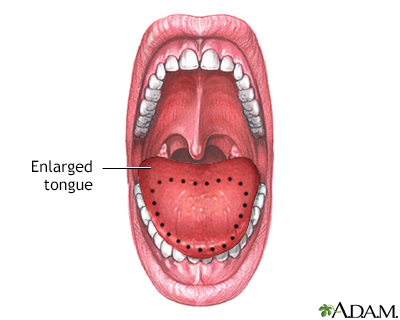Macroglossia
Definition
Macroglossia is a disorder in which the tongue is larger than normal.
Information
Macroglossia is most often caused by an increase in the amount of tissue on the tongue, rather than by a growth, such as a tumor.
This condition can be seen in certain inherited or congenital (existing at birth) disorders, including:
- Acromegaly (buildup of too much growth hormone in the body)
- Beckwith-Wiedemann syndrome (growth disorder that causes large body size, large organs, and other symptoms)
- Congenital hypothyroidism (decreased production of thyroid hormone)
- Diabetes (high blood sugar caused by body producing too little or no insulin)
- Down syndrome (extra copy of chromosome 21, which causes problems with physical and intellectual functioning)
- Lymphangioma or hemangioma (malformations in the lymph system or buildup of blood vessels in the skin or internal organs)
- Mucopolysaccharidoses (a group of diseases that cause large amounts of sugar to build up in the body's cells and tissues)
- Primary amyloidosis (a buildup of abnormal proteins in the body's tissues and organs)
Gallery



References
Alwani MM, Makki FM, Robbins KT. Physiology of the oral cavity. In: Flint PW, Francis HW, Haughey BH, et al, eds. Cummings Otolaryngology: Head and Neck Surgery. 7th ed. Philadelphia, PA: Elsevier; 2021:chap 86.
Rose E. Pediatric respiratory emergencies: upper airway obstruction and infections. In: Walls RM, Hockberger RS, Gausche-Hill M, eds. Rosen's Emergency Medicine: Concepts and Clinical Practice. 9th ed. Philadelphia, PA: Elsevier; 2018:chap 167.
Sankaran S, Kyle P. Abnormalities of the face and neck. In: Coady AM, Bowler S, eds. Twining's Textbook of Fetal Abnormalities. 3rd ed. Philadelphia, PA: Elsevier Churchill Livingstone; 2015:chap 13.